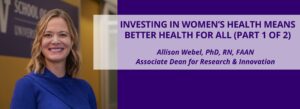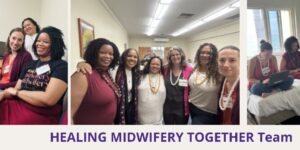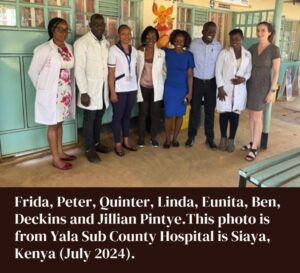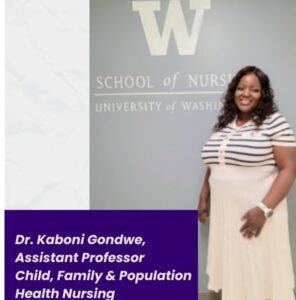
I raise up my voice—not so that I can shout, but so that those without a voice can be heard. … We cannot all succeed when half of us are held back.
Investing in women’s health has countless benefits to families, communities and society as a whole. Organizations often cite the increases in economic productivity (up to a $ 1 trillion increase annually) and the high return on investment (every $1 invested in women’s health has the potential to return $3 in economic growth). While these numbers are certainly impressive, the rationale for investing in women’s health extends well beyond the economic benefits.
Yes, women are daughters and mothers, but they are also critical innovators, creators, caregivers, community leaders, consumers, chroniclers, and hold so many critical societal roles that underpin humanity’s progress and overall state of being. When women are healthy, we are all healthier; yet research into the holistic health of women has often lacked the same focus, resources and attention as men’s health. For over 40 years, the unwavering commitment to enhancing women’s health has driven UW School of Nursing scientists to pursue groundbreaking research — a mission that remains core to the forefront of our efforts today.
The breadth and depth of our collective women’s health research in the UW School of Nursing is so vast; to do this work justice, this anthology will be split into two parts. Building on the Go Global event last month, Part 1 focuses on our research to improve childbearing- becoming, during, or just after a woman gives birth- and childrearing. Next week, part 2 will continue to explore our research focusing on chronic diseases that differentially effect women.
Childbearing and Rearing
American women who seek to become, are in the process of becoming, or have recently become mothers, face shocking disparities in maternal morbidity and mortality compared to other similarly resourced countries around the globe.
Two of our nurse midwifery faculty members, Dr. Clare Sherly and Dr. Ellen Solis, are leading the HEALING Midwifery Together project. This transformative initiative examines the current state of midwifery practice and education in the United States through qualitative, community-driven research. By building relationships and fostering repair within and between midwifery professions, this project will create a more inclusive and supportive midwifery education system. Such efforts are critical for improving the health of women everywhere, ensuring that midwives are well-equipped to care for women, newborns, and all patients needing sexual and reproductive healthcare.
 Generously funded by the Skyline Foundation, which provides $200,000 per year for three years, the project underscores the importance of the UW School of Nursing’s dedication to supporting midwives and will ultimately translate to better women’s and family care. Looking ahead, this project will co-create an implementation plan for an educational program that supports all midwifery professions, sharing knowledge and healing wounds to better support patients and families. This work is about more than just education; it’s about creating a sustainable profession that will make a profound impact on women’s health and overall well-being.
Generously funded by the Skyline Foundation, which provides $200,000 per year for three years, the project underscores the importance of the UW School of Nursing’s dedication to supporting midwives and will ultimately translate to better women’s and family care. Looking ahead, this project will co-create an implementation plan for an educational program that supports all midwifery professions, sharing knowledge and healing wounds to better support patients and families. This work is about more than just education; it’s about creating a sustainable profession that will make a profound impact on women’s health and overall well-being.
Another champion in this field, Associate Professor, Dr. Jillian Pintye’s path to becoming leading women’s health researcher began in Botswana. While serving as a Peace Corps Volunteer, she witnessed the devastating effects of HIV and STIs on women and children. This experience ignited her passion for research focused on these vulnerable populations. Determined to make a difference, Jillian became a nurse scientist, channeling her experiences into advancing health for all women. Her international research team develops new evidence-based tools that improves access to effective HIV and STI prevention and treatment, particularly for young women and pregnant populations. Their focused and united efforts tackle health issues that affect women hardest, amplifying the impact and reach of their work.
 Supported by more than $14M in grants from NIH and the Gates Foundation, Jillian’s research is backed by distinguished sponsors. This funding not only advances HIV and STI prevention and treatment but also trains the next generation of bold, innovative women’s health scientists. Despite current challenges, Dr. Pintye is optimistic. Advances in HIV science bring the possibility of ending the HIV epidemic within our reach. She hopes her research will inform health policies and clinical practices, creating an HIV-free generation.
Supported by more than $14M in grants from NIH and the Gates Foundation, Jillian’s research is backed by distinguished sponsors. This funding not only advances HIV and STI prevention and treatment but also trains the next generation of bold, innovative women’s health scientists. Despite current challenges, Dr. Pintye is optimistic. Advances in HIV science bring the possibility of ending the HIV epidemic within our reach. She hopes her research will inform health policies and clinical practices, creating an HIV-free generation.
Many women face significant barriers to attending critical post-natal appointments, including socioeconomic challenges, lack of transportation, and cultural or language barriers. Assistant Professor Kaboni Gwonde, was recently awarded LHS E-Star funding to address these barriers. This new grant will enable her to generate valuable knowledge that will enable healthcare providers to understand the factors contributing to disparities in maternal and infant outcomes, particularly focusing on how social determinants of health and systemic factors impact access to quality post-natal care. By identifying and addressing these obstacles, Dr. Gwonde’s team can develop targeted interventions to improve post-natal care and support for women across Washington State. Funded by Kaiser Permanente, this project seeks to uncover the reasons behind the low uptake of post-natal care and develop solutions to ensure that all birthing people have a positive and supportive experience during the perinatal period. Dr. Gwonde’s ultimate goal, like many of our UW School of Nursing investigators, is to create a more equitable healthcare system that provides safe and effective care for all women post-birth.
The health of women, and their families, does not stop at postpartum care. For decades, Barnard Center for Infant & Early Childhood Mental Health Director, Dr. Monica Oxford, has been focused on trauma-informed, strength-based approaches to support parents, especially mothers, who have faced adversity. At the Barnard Center, Dr. Oxford’s team bridges research, clinical practice, and policy to ensure that the voices of parents with trauma histories are centered and prioritized in family interventions and support systems. Her efforts have garnered nearly $25M in funding from the NIH, philanthropy, and workforce development contracts with state and local entities over the past decade.
local entities over the past decade.
As she describes it, Monica’s dedication stems from decades of research showing that early relationships shape our brains, bodies, and futures. Her team works to support all caregivers in fostering deep emotional connections with their children, laying the foundation for lifelong health and wellbeing. Looking ahead, Monica envisions a future where human connection is prioritized, enhancing emotional bonds not just between parents and children, but also between providers and clients, students and teachers, and leaders and communities. Her work is pivotal in shaping a supportive and connected society for all families.
Together, the collective work of these scholars is a testament to the power of passion and dedication, transforming women’s health and inspiring future scientists. In reviewing this body of work, it becomes clear that this science embodies the nursing code of ethics, which includes a provision that the nurse promotes, advocates for, and protects the rights, health, and safety of the patient. Today, as in the previous four decades, UW School of Nursing scientists are dedicated to using every available tool of science to ensure that women around the globe are no longer held back by gaps in scientific knowledge.